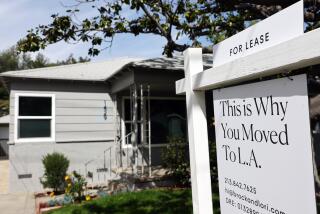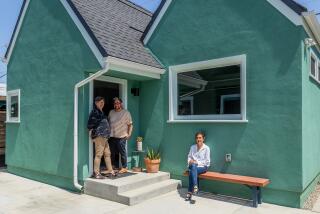An Innovative Place for When Parenting Skips a Generation
- Share via
BOSTON — Stretching her arms as if to encompass her entire brand-spanking-new two-bedroom apartment, 70-year-old Vera Sanders declared that it was time to update the adage that “it takes a village” to raise a child.
“Maybe,” she mused, “it takes this whole building to raise a grandchild.”
Sanders and her 14-year-old grandson, John, last month settled into what is thought to be the nation’s first subsidized housing for grandparents raising grandchildren. GrandFamilies House, a 26-unit “mini-village” with a gabled roof and a broad inviting front porch, is the $4-million co-venture of three nonprofit groups here.
The once-abandoned nursing home is reborn with a playground, on-site day care and multi-age enrichment program. The result is both an acknowledgment that the burgeoning population of grandparents raising grandchildren has special needs and the latest step in a growing national effort to reduce the complexities of this form of relative caregiving. As grandparent-headed households become more common, GrandFamilies House could become a model.
“We surveyed our clients and we listened carefully,” said Janet van Zandt, executive director of Boston Aging Concerns Young & United (BAC-YOU), which several years ago noted that some of its clients were being evicted from senior citizen housing because they had taken in grandchildren. Others were occupying dwellings that were unsafe or otherwise unsuitable for children. Nearly all complained of the frustration of trying to navigate the city’s housing bureaucracy, and to a one they spoke of the isolation of raising children at this late stage of their lives.
Seven years ago, when Harriet Jackson Lyons was 65, the state Department of Social Services asked her to take custody of her granddaughter, Charlene. “I wanted to go back to school. But as I said, I got that call.” Charlene’s mother died last year of a coronary brought on by years of drug use.
Grandparents claim near-sacred status in America’s cultural iconography. There is a pleasant prevailing mythology that grandma is white-haired and apple-cheeked, with a crisp white apron and a perpetual supply of fresh-baked cookies. Grandpa, according to this image, is handy with a tool kit and eager to spin off a yarn of what life was like when he was a boy. Granny and Gramps never tire of serving as backup baby sitters.
Apple-Pie Image False for Many
But U.S. Census Bureau figures show that for a vast and growing number of older Americans, that depiction is false. Substance abuse, incarceration, AIDS and immaturity are only some of the causes of a missing generation of parents who cannot care for their children. From 1980 to 1990, the number of children being raised by grandparents increased by 44%. From 1990 to 1997, the figure went up 23%. Today, 1.4 million children live in a grandparent-headed household with no parent present.
“The assumptions of caregiving, the circumstances under which a large number of grandparents are assuming care of their grandchildren, are no longer voluntary,” said Florida social worker Lynne Katz, who is conducting a study of grandparent-caregivers at the University of Miami.
The mantra of family preservation buzzes loudly in the ears of judges and family-service officials trying to place abandoned children, Katz said. Faced with the option of taking their grandchildren or seeing them sent to homes, she said, “there are very few grandparents who are old enough or incapacitated enough or fed up enough to say, ‘Fine, put the kids in foster care.’ ”
The phenomenon crosses class and ethnic lines but is most pronounced among poor, minority populations. Although 5% of children nationally are being raised by grandparents, in Dorchester--the largely African American, low-income Boston neighborhood where GrandFamilies House is located--the figure is 10%. Recent research by the three agencies that created the project--BAC-YOU, the YWCA of Boston and Women’s Institute for Housing and Economic Development--showed the grandparents in the city to be “overwhelmingly” African American women ages 50 to 86. Most lived on fixed annual incomes of $5,000 to $15,000, and many showed significant health problems associated with age.
In addition, the elderly caregivers faced daunting bureaucratic obstacles. Unlike foster parents, grandparents raising their grandchildren receive neither insurance nor monthly stipends. Often they are living off retirement incomes that strained to support one person.
Some Are Victims of Bureaucracy
Schools and health centers do not always recognize grandparents as primary caregivers, and welfare reform policies that expect parents to be working are no more forgiving for grandparents. Elder meal programs, a mainstay for many low-income grandparents, cease when a child comes on the scene. Clothes often come from donation programs, a tough sell for teenagers. Young people also often long to participate in costly after-school sports.
Then there is the personal energy component. If 20-year-olds complain of exhaustion when they are raising babies, consider the plight of a 75-year-old. By definition, grandparenting is supposed to imply selectivity, the right to send the grandkids home when you’re tired. At GrandFamilies House, some septuagenarians are looking at 20 more years of child-rearing.
“Of course we resent it. Of course we’re angry,” said Lyons, who organized a support group here called ROCC, Raising Our Children’s Children, with about 200 members. “Of course we wonder what we did wrong as parents. And as grandparents, we hope we won’t repeat those mistakes. But that’s what we think about when we have time. Mostly we’re too busy, and we’re too tired.”
Financing for GrandFamilies House drew on federal, state and city funds as well as foundation donations. An innovative interpretation of federal Housing and Urban Development regulations allows most tenants to receive rent subsidies. Sanders, for example, lists her annual income as $12,754. She pays $258 a month for a two-bedroom apartment.
With its wide hallways to accommodate walkers, wheelchairs and strollers, GrandFamilies House also boasts a 4,000-square-foot basement where Boston’s YWCA will offer exercise sessions for seniors and teenagers. Other programs will include computer classes where grandparents can learn alongside their grandchildren.
But as residents continue to move into the just-opened facility, the hope is also that the building will become a self-contained community, where elders who by dint of fate have found themselves at a different stage of life than many of their peers will support one another. “Things like trading child care with a neighbor so you can go to the market,” said Anne Gelbspan of the Women’s Institute for Housing and Economic Development. “We’re hoping that will evolve.”
Around the nation, the success or failure of this multigenerational experiment will be closely watched, predicted Julienne Brown of Grandparents as Second Parents (GASP) in Oakland. “It’s a great idea. I can’t believe nobody thought of it before.”
Possibly, she speculated, the grandparents may also bolster their political strength. Fewer than a dozen states have passed kinship care legislation that enables grandparents who are caring for grandchildren to receive the same benefits as foster parents. A pilot program is in operation in eight California counties, including Los Angeles, San Diego, Riverside and San Francisco, Brown said, offering a version of these benefits. And a lawsuit seeking to guarantee benefits to grandparents and grandchildren is due to be heard next month in Los Angeles.
Surrounded by moving boxes, 50-year-old Sandra Anderson, raising two granddaughters after their mother’s death, said living in GrandFamilies House “will be fun, because there will be older people who can teach me things.” Nine-year-old Taysia Anderson added: “I like it because we will have more people to play with.”
More to Read
Sign up for Essential California
The most important California stories and recommendations in your inbox every morning.
You may occasionally receive promotional content from the Los Angeles Times.













